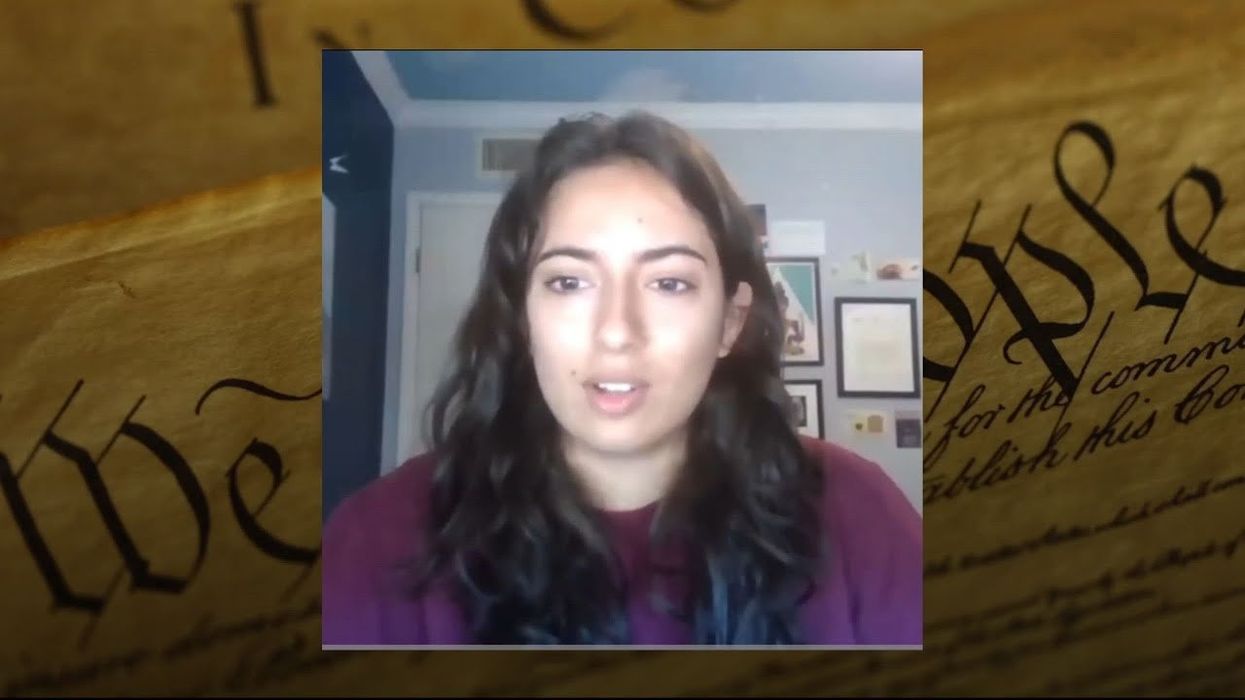- The Fulcrum presents The Path Forward: Defining the Democracy Reform Movement. Scott Warren's interview series engages diverse thought leaders to elevate the conversation about building a thriving and healthy democratic republic that fulfills its potential as a national social and political game-changer. This initiative is the start of focused collaborations and dialogue led by The Bridge Alliance and The Fulcrum teams to help the movement find a path forward.
The latest interview in this series features Sarakanti (Sara) Iyer, an incoming sophomore at Johns Hopkins University. Despite her youth, Sara has already been deeply engaged in political organizing—working on the ground in Arizona and helping lead efforts at Hopkins to bring students from across the political spectrum together.
Most of the leaders I’ve spoken to in this series are heads of organizations—relatively “known quantities” in the pro-democracy space. This conversation was a bit different. I wanted to understand how someone who firmly identifies as pro-democracy—but isn’t necessarily part of the professionalized “pro-democracy community”—views the field.
Sara was a student in a First-Year Seminar I taught at Johns Hopkins, titled "Democratic Erosion" (each JHU first-year student is required to take a seminar, capped at 12 students). Over the course of the semester, the remarkably politically diverse class explored whether, how, and why countries around the world were experiencing democratic backsliding—and whether those dynamics held lessons for the United States. The class was recently featured in The Washington Post, which you can view here.
Throughout the semester, I found Sara’s reflections thoughtful and self-aware, and I wanted to hear more from her about how young people are experiencing this political moment.
To be clear: neither I nor Sara claims she speaks for an entire generation. However, I find that much of today’s analysis of youth engagement with democracy to be both narrow and inconsistent. After the 2024 election, headlines suggested young people were becoming more conservative and increasingly distrustful of democratic institutions. Yet, in the weeks following Democratic Socialist Zohran Mamdani’s decisive primary win in New York City, many outlets began arguing that he now represents the voice of youth voters.
The truth, unsurprisingly, is more nuanced. Young people are frustrated. They’re navigating a fast-shifting political reality that often excludes them. Sara offered three reflections worth highlighting:
- The pro-democracy community is too elitist: Sara points out that the most polarizing divide in American society today isn’t geographic or even economic—it’s educational: between those with a college degree and those without. As a college student, she’s attuned to the risks of a pro-democracy movement dominated by highly educated actors.
“I think when you have had the privilege of a whole lot of education…you can see other people who might not have had the privilege of the same education as not being as aware, and maybe miss…that their opinions can provide a completely different perspective, and shed a light on the problems with our democracy that you might not be able to recognize because you are in that privileged position of being able to have so much education.
I think the way that this is received by people who may not have had the privilege of higher education or may not have wanted to attend higher education institutions is condescending.
It’s a point worth considering: how often does the pro-democracy field actively include people from diverse educational backgrounds? As Sara puts it:
“I see the pro-democracy movement in the United States right now comprised of those educated individuals, and maybe as alienating to some other folks, some citizens in the United States who might not share those same characteristics. I would like to see the pro-democracy movement be more welcoming and inclusive to those who do not share the same characteristics as it currently does.
- Young people are frustrated and feel like they’re not being represented: This is becoming increasingly clear: politics is dominated by older generations, and young people don’t see themselves reflected in positions of power.
As Sara notes, “I think that there's this misconception that young people really don't care, because so many young people are kind of tuning out in that sense. But I think the issue is that young people care so much, and we're not seeing that reflected in our politics….
Politics right now is run by people who are 60 to 80 years old, maybe 60 to 90 years old- and they don't communicate in the same way that people who are 18 to 35 maybe do."While Mamdani’s race has drawn attention to youth enthusiasm, I suspect media narratives may overemphasize the appeal of his specific policies. What’s likely more resonant is the hunger for new leadership—voices who simply understand younger generations and communicate in ways that feel relevant.
- Young people want change- and fast: Democracy is designed to move slowly—checks and balances prevent rapid upheaval. But young people, shaped by a world of instant access and feedback, often want more immediate results.
I’m personally not sure we want political change to happen overnight. However, democracy must be viewed as a vehicle for change, or it will lose its legitimacy. As Sara reflects, “The way that you can make the quickest change has definitely been one of the leading factors in how young people vote. I think that's why a lot of young individuals did vote for President Trump. Maybe it's the assurance that you're actually doing something.”
If democracy is only defended through defensive posturing—guarding institutions, preventing regression—it may not offer enough for a generation seeking agency and impact.
I appreciated Sara’s candid thoughts, and it gave me a lot to think about. I want to continue reflecting on how young people are thinking about this moment and bring in more diverse opinions and perspectives into the frame, as Sara has urged.




















Trump & Hegseth gave Mark Kelly a huge 2028 gift